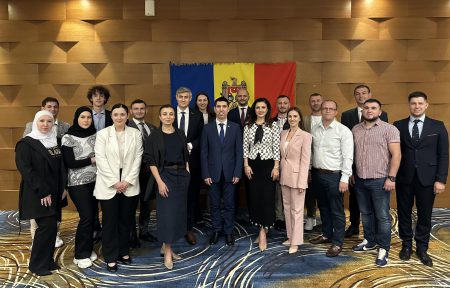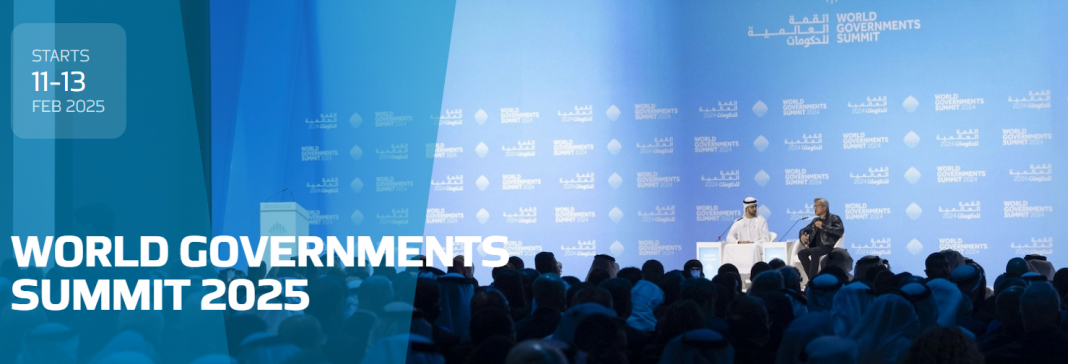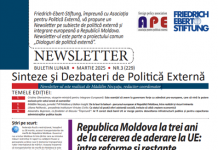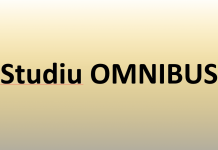World Governments Summit 2025: Informative Note
The World Governments Summit 2025, under the theme “Shaping Future Governments”, is taking place from February 11 to 13 in Dubai. The event brings together over 30 heads of state and government, more than 120 government delegations, and over 80 international and regional organizations, along with executives from multinational corporations and global technology companies. The summit features a rich program, including around 120 interactive sessions and workshops, 25 keynote speeches, 15 forums, and more than 200 speakers. Among the distinguished guests are Kristalina Georgieva, Managing Director of the International Monetary Fund (IMF); Ahmed Aboul Gheit, Secretary-General of the Arab League; and Haitham Al Ghais, Secretary-General of OPEC, along with top executives from companies such as Google, Mastercard, AstraZeneca, and Dow Jones. The summit aims to develop solutions that will drive global progress over the next decade. The key question is: What does the future of smart governments look like, and can they drive a breakthrough in human development?
This year, Dubai is hosting the 12th edition of the World Governments Summit (WGS 2025). The discussions are designed to enhance the capabilities of future governments and strengthen international cooperation. The summit agenda focuses on six key thematic areas:
Effective Governance and Accountability
In recent years, governments worldwide have sought to increase decision-making efficiency, enhance transparency, and strengthen engagement with civil society and citizens. However, public criticism and dissatisfaction persist. To address these challenges and identify effective compromises, summit participants will discuss: What strategies can be implemented to foster greater transparency and enhance government capabilities? How can citizen and stakeholder engagement be maximized in the policymaking process to ensure effective policies are implemented?
Financing the Future and the Global Economy
Sustainable development and stable financial growth are crucial in the current global landscape. As rapid economic transformations unfold, new approaches are needed to analyze investment opportunities and ensure global economic stability. Governments face increasing difficulties in managing financial resources effectively due to globalization, technological progress, and shifting geopolitical landscapes. Key questions include: What strategies can mobilize capital and drive investment in emerging sectors? How can international collaboration and innovative financing models address global economic challenges?
Climate, Crisis Mitigation, and Resilient Cities
Climate change and urbanization are increasingly interconnected. The resilience of cities and the development of urban infrastructure are of paramount importance. Cities must be equipped to withstand and recover quickly from crises, natural disasters, and economic shocks while remaining functional and sustainable. Governments must actively tackle these challenges through innovative urban planning and effective governance. Summit participants will explore: How can urban areas be designed and managed to enhance their resilience? What strategies and best practices are essential for developing infrastructures that are both sustainable and adaptable?
Human-Centric Futures and Capacity Building
In an era of unprecedented technological innovation and social change, governments must prioritize human-centered development, focusing on individual needs and capacity-building for technological integration. A future that prioritizes human progress requires a holistic approach, combining technological advances with social innovation. Key questions include: What strategies can enhance human potential and foster inclusive growth? How can education, skills development, and equitable access to opportunities help build resilient societies?
Global Health Transformations
Global healthcare is undergoing profound changes due to technological advancements, demographic shifts, and evolving challenges such as pandemics, epidemics, and chronic diseases. Health systems struggle to keep up with the growing burden of chronic conditions. Discussions at the summit will focus on: How can healthcare providers and policymakers innovate to meet these complex demands and ensure equitable access to care? How can cutting-edge technologies, personalized medicine, and data-driven approaches build resilient health systems?
Emerging Frontiers and the Future
Emerging trends, including artificial intelligence, quantum computing, biotechnology, and sustainability-driven technologies, are transforming every sector. Key discussion points include: How will these trends impact society, governance, and the global economy? What strategies can be employed to harness their potential while mitigating associated risks?
By understanding and anticipating the future, can we create a resilient and prosperous world, ready to adapt to rapid changes and leverage new technologies for the greater good? Key Speeches at the Summit At the summit’s opening, Mohammed Al Gergawi, UAE Minister of Cabinet Affairs and Chairman of WGS, highlighted global conflicts, humanitarian crises, economic challenges, and technological breakthroughs that have shaped the world since 2000. Over the past 25 years, wars and conflicts have claimed 2 million lives, and around 120 million people have been displaced. He emphasized that humanity is at a critical turning point and must learn from past mistakes: “We are at a completely new crossroads, entering a new era. Shaping the future is in our hands.”
Klaus Schwab, Founder and Executive Chairman of the World Economic Forum (WEF), stated that the world is shifting from the industrial age to the ‘smart era’. He noted: “We are transitioning from the industrial era to the intelligence era at an unprecedented pace, far beyond previous transformations. In this new age, information, data, and intellectual ideas are key. Governments must facilitate these changes, ensuring the necessary infrastructure is in place.” Schwab also stressed the crucial role of education, urging governments to collaborate on policies that integrate new technologies. “Current international efforts are insufficient,” he added.
Key Speakers: Prabowo Subianto, President of Indonesia Andrzej Duda, President of Poland Anura Kumara Dissanayake, President of Sri Lanka Tony Blair, Former Prime Minister of the United Kingdom Sundar Pichai, CEO of Google Abdulla bin Touq, Minister of Economy of the UAE Faisal F. Alibrahim, Minister of Economy and Planning of Saudi Arabia.
Among the participating executives from major multinational corporations: Elon Musk (SpaceX, Tesla, X) Sundar Pichai (Alphabet) Larry Ellison (Oracle) Joseph Tsai (Alibaba) Brian Niccol (Starbucks) Robin Li (Baidu) David Baszucki (Roblox) John Giannandrea (BlackBerry) Arvind Krishna (IBM) Christian Klein (SAP)
Elon Musk, former UK Prime Ministers Tony Blair and Boris Johnson, the CEO of Google, as well as the Presidents of Indonesia, Poland, and Sri Lanka – and this is only a partial list of participants at the Summit. Elon Musk, the world’s richest person and owner of X, who is also implementing former U.S. President Donald Trump’s vision of reducing the size and expenses of the federal government, participated in the plenary session “Boring Cities, AI, and DOGE.”
Moldova’s Participation
Among the many participating countries, the Republic of Moldova is also actively engaged in the World Governments Summit. The Moldovan delegation is led by Foreign Minister Mihai Popșoi. His agenda includes bilateral talks with UAE Foreign Minister Sheikh Abdullah bin Zayed Al Nahyan, as well as meetings with officials from Moldova’s partner countries and a gathering with the Moldovan diaspora in the UAE.

Moldova continues to play an active role in international affairs, promoting an open and pragmatic foreign policy. In recent years, Moldova has strengthened its ties with the UAE through expanded diplomatic contacts, trade and economic cooperation, investment partnerships, and legal and technical collaborations.








